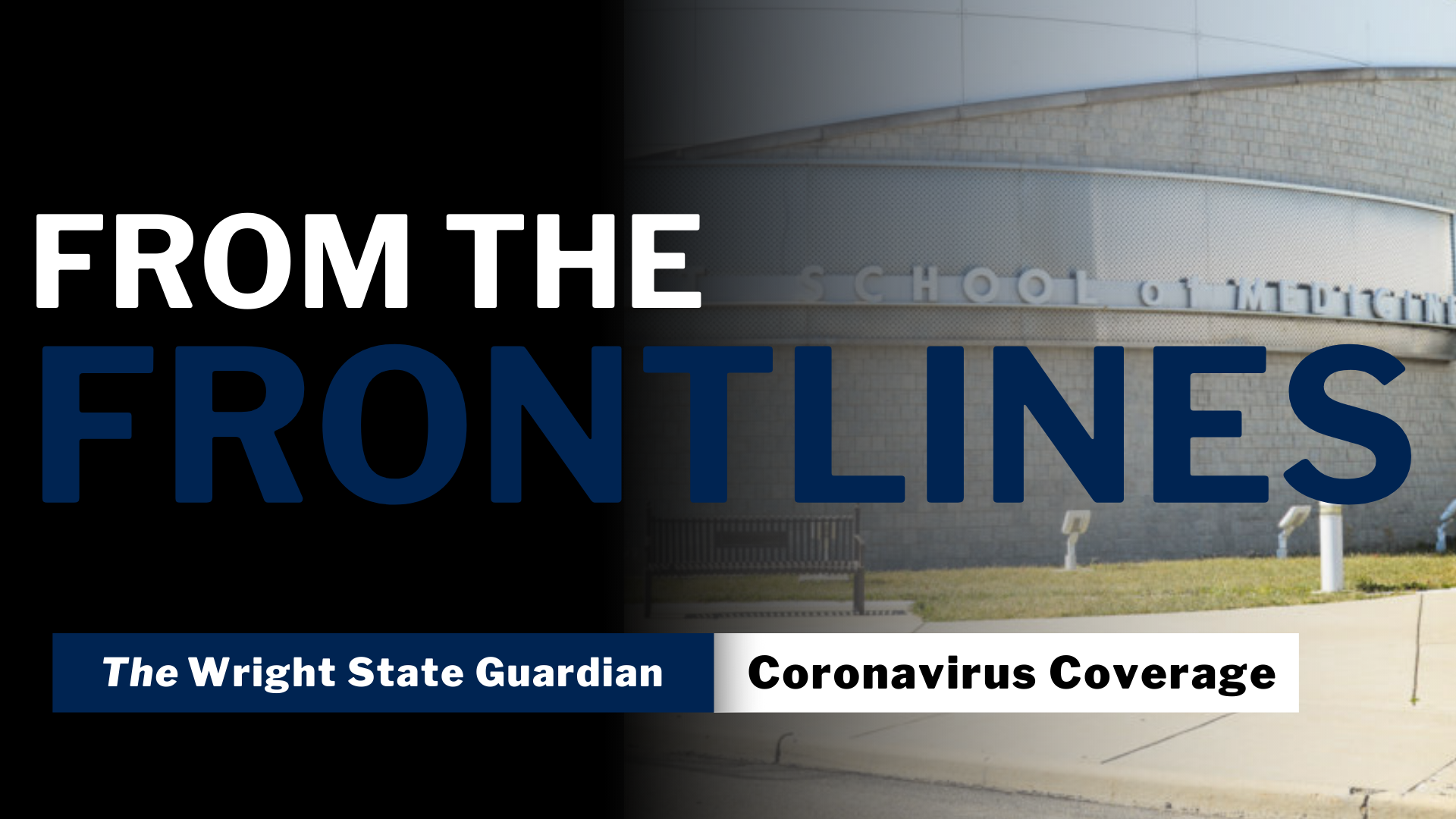
Graphic by Dylan Collison
The coronavirus has drastically changed the lives of Wright State University (WSU) students and residents who currently work or are preparing to work in the medical field.
Time to prepare
“I was in my training when the AIDS epidemic started, and I know how frightening it was,” said Glen Solomon, chair of internal medicine and residency program director at WSU. “We’ve seen a number of very scary infections over the years but never anything with the scope of coronavirus.”
According to Solomon, coronavirus is different from anything else because there is not a prevention or treatment.
This is why the country has had to rely on quarantine.
“The longer we can put off the peak, the better it is,” said Solomon. “That time is clearly to our advantage that we have a chance to get things up and running. Anything we can do to delay that peak is to our advantage and I think we’ve been fortunate in Ohio, in that regard.”
Solomon says that the quarantine is important in order to provide the hospitals with adequate time to prepare and plan for the eventual peak.
As of Tuesday, there are 7,153 cases in Ohio, according to the Ohio Department of Health. Nationally there are 579,005 cases, according to the Center for Disease Control and Prevention.
Empathy and appreciation
Rachel Thomas, an internal medicine resident for WSU, has been working in the ICU since the beginning of the coronavirus pandemic in Ohio.
“I have, more so than any of my other months in training, been able to put myself in the shoes of the patient and how scary this must be for them,” said Thomas.
Besides working long hours and not being able to see her family, Thomas says the hardest thing is watching coronavirus patients go through it alone.
According to Thomas, visitors are no longer allowed in the hospital unless it is an end-of-life situation.
“We try to call as many families as possible to give daily updates, but it’s absolutely heartbreaking to hear the pain in their voices from not getting to be by their loved ones’ side,” said Thomas.
This situation has allowed Thomas, and others in her position, to empathize with their patients and try to comfort them.
“This virus is bringing people of all ages, races and health histories [the healthy and unhealthy] to their knees,” said Thomas. “It’s hard to watch. It’s even harder to watch these people be alone doing it.”
“The young people coming in who’ve never had to be hospitalized for anything [are] now being intubated and sedated,” said Thomas. “[They’re] absolutely terrified calling their families, telling them they won’t be able to talk to them for a few days.”
To Thomas, the experience is a bit unsettling but has made her appreciate nurses and respiratory teams more than ever.
Courage in a tough situation
According to WSU resident Peter Li, the atmosphere and focus has completely changed.
“There is now a sense of eeriness lurking in the background with every face to face encounter, be it patient or colleague; with every object or surface that we touch; and with the void in our schedules that we used to dedicate for education,” said Li. “The focus has shifted from learning to surviving.”
Li has also developed courage while treating patients during the coronavirus pandemic.
It can be quite scary to know that he is treating a patient who has tested positive for the virus.
Despite his fear, Li goes into every room and treats every patient the same, ready to help them heal.
“But I go in nonetheless, because that person has been placed under my care, and it is my responsibility to try to help that person heal,” said Li. “I do all this while feeling that the current guidelines aren’t adequate in terms of protecting us from exposure compared to other countries.”
This virus has placed medical professionals in a new and unique situation.
Families have developed a new level of trust in the medical staff, taking news and updates over the phone without seeing the patient.
Passion for healing
Amidst long hours, hard decisions and uncomfortable situations, these healthcare professionals have no regrets about the profession that they chose.
“I can’t imagine a future where I am doing anything else,” said Li. “My passion for healing and teaching is what brought me to become a physician and that’s not something I am willing to turn my back on.”
Bentley Peed, senior nursing student at WSU, is eager to finish his clinicals. He wants to start making a difference out in the field.
Due to the pandemic, WSU moved clinicals for nursing students online to minimize exposure.
For Peed, whichever specialty he chooses, he knows that he will be able to make an impact on others’ lives.
“I want to use what I have learned to help people to the best of my ability and show my capability of being a professional nurse,” said Peed.
Prejudice from the pandemic
Li has experienced a different byproduct of the pandemic that has nothing to do with his profession: prejudice.
“Let me preface the personal aspects with me being an ethnically Chinese Asian American from New York City,” said Li. “While I have never experienced any outright hate crimes here, I have experienced the xenophobia that [coronavirus] has produced as an unfortunate byproduct.”
Li is disappointed that such large-scale prejudice exists in this country.
“I get funny glances and stares in public places, such as grocery stores, followed by a quick scurry in the opposite direction even when I am nowhere close,” said Li.
Despite all this, Li is thankful he has a job and the ability to help others during this time.
“I’m hoping to somehow make [the healthcare system] better in the future than when I found it,” said Li.
